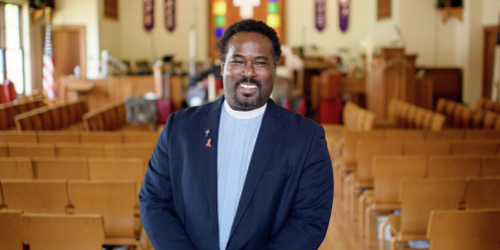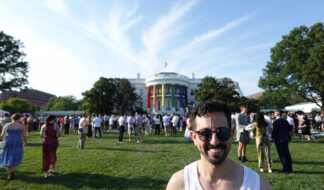BY EMELL DERRA ADOLPHUS

If you Google search Rev. Roland Stringfellow, you'll find a picture of him in his religious robing speaking to a sea of people on Castro Street in San Francisco, California, circa 2008.
Stringfellow lived in San Francisco Bay Area when then Mayor Gavin Newsome directed the city's county clerk to issue marriage licenses to same-sex couples in 2004. The window to get married was brief between Newsome's directive and the California Supreme Court's nullification of the resulting marriages. Nevertheless, the gay community persisted.
The moment, though short-lived, was monumental for all lesbian and gay couples in the Golden State, explains Stringfellow, because marriage seemed tangible for the first time.
"As a gay man, up to that point, we all were just accustomed that marriage is not for us," he remembers.
Not yet ordained, Stringfellow was a student minister at the Pacific School of Religion in Berkeley, California. And while there certainly was groundswell of support for marriage equality in California, his real watershed as a Black gay man in the marriage equality fight came in 2008.
Barack Obama was on the election ticket as well as Proposition 8 – a ballot proposition that would make same-sex marriage illegal in California. Each of them had immense support for different reason, but Black people were blamed for the success of both.
"Many whites in the LGBT community began to scapegoat African-American voters. So a false narrative was told," says Stringfellow. The perception of some California voters was, he explains, "Why would Black people vote against us?"
"There were walls erected and it took time and a lot of head-butting to get the campaign decision makers to understand that we have to create a greater coalition if we want to be successful," he remembers.
From that moment, Stringfellow says he set out to change the color of marriage equality fight on the frontline: to show that marriage equality was more than something that only white couples were interested in.
"The fact that I was clergy, every time I showed up to an event or a rally, I came in my clergy collar," he says. "I wanted to challenge the image that religious people, particularly Christians, were not all set against marriage for same gender loving people. And that was my mantra from 2008 to 2013."
In Michigan, after the monumental marriage equality decision came down two years ago, celebrations spilled into the streets of cities Ferndale, Royal Oak and Saugatuck, the gay Hamptons of the Great Lakes. However, what seemed like a world away, some black lesbian and gay men in Detroit were not as moved.
Here's why: When it came to mobilizing for marriage equality, pictures were worth more than a thousand words. In one quick snap, they can eternize memories and emotions. But depending on where you're standing when the camera flashes, especially if you are a person of color, you could be left out of a movement entirely.
"In order to motivate the masses, the masses have to see role models or examples they can relate to," says Stringfellow. "Thus we now have skin in the game. And yes, we are going to be more politically active for that reason."
Now that couples can legally be married, Stringfellow, senior pastor and teacher at the Metropolitan Community Church of Detroit (MCC Detroit), has turned his attention to making sure everyone everyone can reap the benefits of the fight for marriage equality. This process takes shape in first teaching people why same-sex marriage is not wrong.
When Prop 8 was passed in California, Stringfellow was approached to formulate a curriculum to help African-American religious leaders, from a biblical scriptural standpoint, understand the benefits of having a community that is unified and not divided on the topic of LGBTQ inclusion in the church.
"Is it possible to love and embrace those who are in your community who are LGBTQ and keep your integrity," he says. The curriculum is entitled "Umoja," from the Swahili word meaning "unity."
"I explain to these pastors and bishops the harm that is caused when they encourage parents to abandon their children when they come out of the closet. That's what's breaking up the family," he says, explaining that marriage is still mostly considered religious act, leaving many black LGBTQ people to feel rejected by its idea.
Stringfellow, 48, grew up in Fort Wayne, Indiana. He was a Baptist minister and left his church when he came out in 2000, thinking he couldn't be gay and godly.
Last month, Stringfellow presented his Umoja Project to a group of about 11 people studying to become leaders within the church from different branches of faith at the Ecumenical Theological Seminary in Detroit. On the subject of same-sex marriage, some people were conflicted. Others were curious. But all of them wanted to understand.
"When I came out the closet, I had to make a decision, do I stay in the black Baptist church that is non-affirming and even lashes out in spiritual violent ways towards me? Or do I find a church that is more affirming that might not speak to me culturally? Where do I go?, " says Stringfellow, "And I think for many queer people of color that's a serious dilemma."
With the passing of time, as same-sex marriage and LGBTQ equality becomes more accepted, it's important that more diverse community leaders are included at the decision-making tables. In the black community, that starts with the church, says Stringfellow. "Even within the Trump era, LGBTQ equality will continue to make strides. Yet, how long will LGBTQ Christians have to wait for their churches to also make strides in welcoming them home 'just as they are?'"
With leaders like Stringfellow, we won't have to wait long.
Editor's Note: View from the Bottom is a weekly column written by Emell Derra Adolphus that examines black gay sex, people & politics in metro Detroit. The "bottom" refers not to sex but to societal position, taken from the point of view of someone who is continuously marginalized. Commiserate and share your stories at [email protected].










